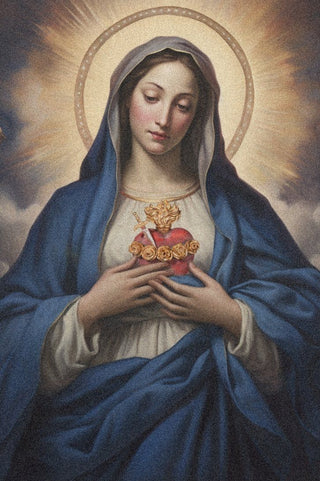
Why a whole month dedicated to Mary's heart? As an outsider, it may seem strange that Catholics focus on so many particulars- The Sacred Heart, The Precious Blood of Christ, or in this month, the Heart of Mary. But as an incarnational faith, the life of grace is experienced in the particulars of life. Therefore it is helpful when entering deeper into the life of faith to meditate on certain particulars to enhance our understanding of how God desires to work in our life.
Mary’s Heart signifies her interior life. Examining this aspect of Mary reveals the significance of the proper interior disposition one should have towards God.
Reflecting on the choices Mary makes gives us insight into where her desire and heart lie. The first decision we see Mary make is at the Annunciation where Mary says yes to being the Mother of God.
Why Mary? The Lord could have become a man without the aid of humanity. Why choose this unlikely partnership? To a modern person, Mary makes no sense. She is everything the world despises about women. Mary is silent, submissive, and dependent on the Lord (the patriarchy or her patriarchy) for everything. By looking at our ancient mother Eve, we see by contrast how Mary is a fitting vessel for the Lord; for as sin enters the world through Eve's heart, redemption enters the world through Mary's heart.

Eve, our first mother, allows herself to doubt God’s goodness by believing that He is holding out on her. When Eve is in the Garden of Eden the Lord has given Her and Adam an abundance of earthly goods and a direct relationship with Himself. Despite the myriad of goods at her fingertips, Eve allows her head to be turned by the serpent. “The woman saw that the tree was beautiful, that its fruit was good to eat, and that it would make her wise.” In this passage, Eve sees an opportunity to advance herself by herself. Eve does not consult her husband or God to ask why this apple is alluring or to question the validity of the serpent's persuasions. Rather, she is full of herself and her desire for “wisdom” to empower herself. She relies solely on her intellect and is blinded by her selfish desires. This interior disposition leads her to consume rather than consummate and bear death rather than life. Eve's choice to eat the forbidden fruit cuts off the life of grace within her and her children.
Mary on the other hand is “full of grace”. It is this interior disposition that is the fertile soil that allowed for the word of God to enter into the universe. Mary says very few things in the bible and almost has a hidden life from the reader. Yet it is said of her that she is “full of grace”. Her heart and will is completely immersed in the will of God. This allows her to totally accept God’s will to enter into the most intimate relationship with her and therefore humanity at large. The door to Mary’s heart is wide open to the Lord which allows him to work in her and the world. Mary's heart, being full of the Lord rather than selfish desires, allows her to choose God's mission for her life.
The fact that Mary is full of grace, does not blot out her identity into a vapid wisp-like human but rather sets her free to be formed into a full person and empowers her to fulfill her mission. Eve on the other hand is stunted and unable to fulfill the mission God set before her and her husband, “Be fruitful, multiply, fill the earth, and subdue it.” They lose mastery of their bodies as sin enters and subjugates their wills to the desires of the flesh, along with losing mastery over creation. They breed sin and division, unable to pass on the life of grace they rejected, subsequently leaving an inheritance of death to their offspring. In opposition to Eve, Mary’s mission is to nurture us into the life of grace. The ability of each of these women to fulfill their mission begins in their hearts with their wills either trusting in or doubting God's goodness.
Do we trust that God has the best plan for our life? Or do we find ourselves relying on our limited vision to decide what we should do?

Another moment where Mary’s heart is revealed is at the finding in the temple. Losing a child anywhere is a mother’s worst nightmare, let alone for three days. When Mary finally reunites with her Son and asks, “Son, why have you treated us like this? Your father and I have been anxiously searching for you.” He responds with some hard words for her saying, “Why were you searching for me? " he asked. Didn’t you know I had to be in my Father’s house?”. Mary chooses to respond with humility and wonderment at her son. She does not reprimand him but simply, “treasure(s) all these things in her heart.” Her response to God’s mysterious ways is to cherish and ponder what he has allowed her to undergo and see. Mary is not belligerent and angry as many of us are at God’s stubborn knack for giving according to his nature rather than our nature or understanding. Mary faces true hardship and she chooses to cherish the experience, to hold it as something dear to her. This stems from Mary's unwavering trust in God's Goodness and understanding that His ways are far beyond our understanding and are therefore mysterious.
This mystery is not just a passing moment of awe but is alive in Mary's heart. It is what occupies her mind and gives way to a reflective disposition. Mary's heart is constantly treasuring the words of her son and therefore God's word. She ponders them.
In the busyness of our lives, do we find ourselves pondering the mystery of God? Do we marvel at His ways? Do we encounter and discover Him in our everyday lives? If not, perhaps we need to refocus our interior eye on the Lord. Take five minutes to read the Gospel of the day and like Mary, ponder these things in our hearts. Actively recall a verse or theme that stuck out to you.

Mary shows yet another unique aspect of her interior life during the wedding feast at Canna. In this moment Mary's mission of mediation for Christ is revealed. Mary yearns for others to know her Son and to participate in his saving grace. The wedding at Cana is Christ's entrance into his public ministry and it is Mary who prompts this movement. Mary acts as an intercessory between Christ and those he longs to save. Mary’s Immaculate Heart is a bridge to the heart of her Son.
Are we a bridge to Christ for those we encounter? Do we honestly desire the salvation of others? If I'm being honest I find it incredible that God desires everyone's salvation. I mean you're telling me God wants the frumpy blue-haired Starbucks worker to be with him as much as me, truly a hard truth to swallow. I constantly need to be reminded that I am here to be an occasion of grace for others, even those, who in my pridefulness, I find off-putting or unworthy.
Many people wonder where God is in their life, Or why he does not make himself manifest to them. But the Lord is no dictator; he has given us free will for us to choose him without coercion as Mary does. He wants our partnership so that through us he may work out our salvation and that of others. This partnership, or wedding of wills, starts within our hearts, our interior life. The Lord longs for us to let him into our hearts. Throughout the Bible, we see the Lord is jealous of the affection of his people. He is not satisfied with exterior signs of worship and sacrifice he says, “Circumcise your hearts”, showing that he desires for us to undergo interior transformation.
It is in Mary that the Lord finds a welcome dwelling, not simply to be hidden away but to take root as to bear eternal fruit in the hearts of man. In Mary's trust, pondering, and intercession of our Lord, she exemplifies the perfect interior disposition; in other words her immaculate heart.
Author: Marie Gomez
Let us know your thoughts here.
Take Mary's Heart with you everywhere you go. Check out our Cor Mariae Collection here.



Katherine
God Bless y’all! Can you guys help me locate a certain holy card titled:’For Visual Effect’ TJP#752 on back:’My Reminder’ It’s black/white pic of J.C. Really cool. Got it long time ago from St.IgnatiusChurch inWPB,Fl. gift shop and told to go to:TotallyCatholic.com website and hence: here.
Hope you can help me.Thks!
Katherine Merosky,(561.789.8952)
kash528@aol.com
Charles Ashibuogwu Chibuzor
I’m so Glad to come across your information
M F Thorn
I’m always looking for good Catholic musings that I can read quickly. Three paragraphs is plenty. If more than that, I don’t bother.
FrAnthony Sortino
Well written, Tracy, and thank you for honoring our Mama in Heaven with this lovely and in-depth reflection! It is always beautiful to “sing the praises of our Mother” and, as St Bernard said “numquam satis” (it is never enough!)
Blessings to you all and keep up the great work for the Lord and His kingdom!